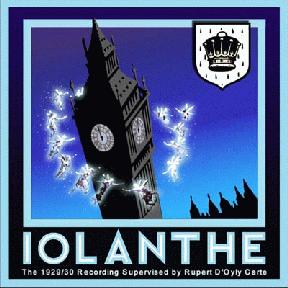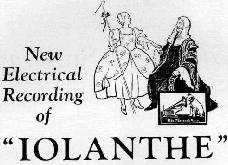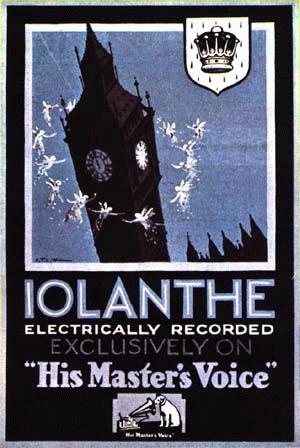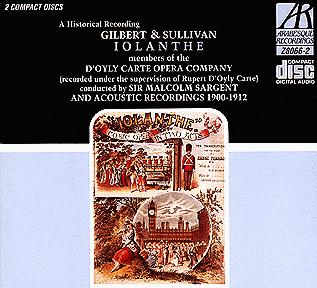The 1929 D'Oyly Carte Iolanthe
Chorus and Light Opera Orchestra
Recorded in London, |
|
 Sounds on CD VGS 205 Cover art by Matt Bland |
By 1930, public interest in G&S recordings was evidently at an all-time high. This was the first of three sets issued that year, with more to follow in 1931. For the most part, this set featured D'Oyly Carte singers in all the important roles. The sad exception was the Lord Chancellor. Although Henry Lytton was still going strong on stage, he was judged too old to record the part, and so was replaced by George Baker, a capable singer to be sure, but one laments the failure to preserve Lytton's interpretation of such an important role.
This recording was re-issued on CD, LP and cassette by Arabesque. It has also been re-issued on CD by Pro Arte and Intersound, and more recently by Chris Webster Sounds on CD. J. Donald Smith reports that the Intersound re-issue is on one disc, but is missing the overture, and all the multi-verse numbers are cut: three verses down to two, or two verses condensed to one. Says Don, "It sounds exacly like the same transfers as the Arabesque issue, but a little cleaner and, as a result, deader."
About his new CD re-issue, Chris Webster writes:
I have licensed the EMI transfer of this recording. I believe that it was made by pressing vinyl records from the metal masters in 1979, thus eliminating any shellac surface noise, and so although it is pre-CEDAR, what surface noise there is is remarkably quiet, and the actual sound of the recording is very bright, crisp and clean. This particular transfer has been available before — but only once on CD (from Arabesque).
The Arabesque CD had a slip up in the middle of the Act One Finale (a chord was accidentally cut into during the 'Our wrath ..' declaration section; this is not the case with my release ), and also the tracking on the CD was unsatisfactory (only 19 cue points for the whole opera — I have 41), so even if you have the Arabesque issue you may want to consider my 'improved' version, but if these two matters do not bother you too much then in all honesty I shall say that you probably won't want to get my new issue.
There is/has been a different transfer of the recording available on CD on the Intersound label (in the States only I believe), but this is inferior in sound quality and is also cut down to about 72 minutes as opposed to the 85(ish) minutes that the complete recording runs to.
Of course, my own package would not be complete without the fine 8 page booklet, featuring a synopsis of the performance, a history of the recording (and what a history this one had — nine sessions), full details of the recording sessions (as per the authentic HMV artist sheets), biographies of all the artists, and topped off with a fab cover which is a restoration of the original 1930 advertising flyer.
James Tappin had these comments about Webster's CD re-issue:
This has to be technically the best reissue of any pre-war G&S on CD. Unless I really concentrated it was very easy to forget that I was listening to a historic recording. This recording clearly shows the advantages of being able to work from the original masters rather than from records, which have (a) one more layer of surface noise introduced in the production process; and (b) almost certainly been played (probably with steel needles on a wind-up phonograph) and thus are very rarely to be found in mint condition.
Artistically this is one of the classics of the "golden age" with a uniformly strong cast, I would say that every performer is as good or better than those on any of the other recordings.
LEADUP TO REVIEW IN THE GRAMOPHONE
 The Gilbert & Sullivan News — June 1930 |
[The January issue of The Gramophone for 1930, (Vol. VII), featured an article 'The Swish of the Scythe — Deletions from the H.M.V. 1929 Catalogue' on page 371, which included the following observation: — "The Pirates of Penzance" is, of course, supplanted by the new set, and since "Iolanthe" is mentioned in this deletion list, we can only presume that this work will appear electrically recorded early in the coming year. I hope so." This prompted the following letter, which was included in the April 1930 edition, page 500]:
Dear Sir, — In the article entitled "The Swish of the Scythe" (January number) it was thought likely that a new set of Iolanthe was to be issued soon. If so, I fervently hope, and so am I sure do all other enthusiasts, that the policy of an all-Savoyard cast is going to be maintained. The Yeoman and The Pirates did not include Lytton, Fancourt or Bertha Lewis, for instance. Of course, this may have been due to uncontrollable circumstances, not to anyone's decision, but whatever the reason the disappointment was considerable. One hates to think of anyone but Lytton as the Lord Chancellor or Bunthorne, and similarly of the others after hearing them in previous sets. No disparagement of George Baker is intended; the fact simply is that certain experience is needed that it is not possible for him to have had. It is difficult enough for Savoyards; every listener thinks of the best performer he has ever heard.
Knowing as one does what pains are taken in making these Gilbert and Sullivan records, it is surprising to find a lapse here and there. Purchasers will know the instances I mean, and I can avoid references to individuals by quoting the Cachucha as an instance; somewhat perfunctorily played, no dance music after the chorus, and no castanets. I have known it danced on the pavement, but not to this record. As a new and (in my opinion) vastly inferior version of the dance is now done at the Savoy, one badly wants a good record as a partner to the mind's eye.
Should we not also like records of The Sorcerer, Utopia, Limited, and also Cox and Box? Whether Sullivan would "pot" as successfully as Der Freischütz I am not sure, but I should like parts of Sullivan's non-Gilbertian works, and thank "Velvet Face" for having the enterprise some years ago to record When the budding bloom of May from Haddon Hall. And why keep on recording The Lost Chord and The Sailor's Grave, which critics delight to use as occasions for sneering? Why not his Shakespearean songs, Symphony in E, Tempest music?
Mention of Der Freischütz reminds me of a misleading detail in your critic's remarks. The album and words are in this country only obtainable by special order and on extra payment.
When is a company going to record a Mozart opera, in full or potted?
N. O. M. Cameron
Bressay, Shetland
[The new Iolanthe album is on its way to Mr. Cameron for review. —Ed.]
[THE GRAMOPHONE, May 1930, (Vol. VII); pg. 573]
[Note: Throughout this piece, reviewer N. O. M. Cameron compares the recording to the earlier HMV set, recorded in 1922. Cameron's review of that set is available on another page.
Incidentally, Cameron lived on Bressay in the Shetland Islands (as his letter in the April 1930 edition revealed), but he was evidently returning the records to the Gramophone's Editor, Compton Mackenzie, who resided on the Channel Island of Jethou (which is adjacent to the islands of Herm and Sark) — hence the comment that the records travelled 700 miles to reach him. The island was evidently overrun with siamese cats, which explains Cameron's other comment.]
These records travelled 700 miles to reach me at the top of the map in the best of all islands, and will now travel even further to another island at the bottom of the map, which, though it contains more cats to the acre, cannot rival mine. On their arrival I looked eagerly to see if Lytton was in the cast; he is not. By a coincidence I wrote a letter to THE GRAMOPHONE on this point before I knew that the issue of this set was so imminent, or that it would be sent me for review. After hearing it, I do not feel I need to add to or alter what I said in my letter, which appeared last month, and in the criticism of the old set (August, 1927), except to say that I am sure George Baker is right to concentrate on being correct and distinct, giving us every word and note.
 HMV Flyer |
I thoroughly enjoyed the Overture, which is now on two sides and complete. There is no good moment at which to make the break, but this cannot be helped. At the Savoy this season the opening, in which the first few fairies used each to trip on alone, has been changed. Listening to the gramophone one can imagine it as one likes. The chorus and solos (Alice Moxon and Beatrice Elburn) are well and clearly sung. In Iolanthe from thy dark exile, I now understand what my expert collaborator meant about the orchestra being "not merely an accompaniment, but intended by the composer as an important integral part of the opera," and think he would be satisfied now. The cuts formerly made in the next four items are now restored, and None shall part us treated with the respect it deserves. Leslie Rands at his first entrance with Good morrow, good mother, contrives to suggest that he is "inclined to be stout"; all the same, I cannot help regretting the retirement of Sydney Granville to the congenial gloom of the sentry-box. The symphony before the Peer's chorus is now given in full, and the brass comes out well in this record. The chorus is good and full-bodied, and the occasional piano effective. It overflows onto the next record, and the break is most awkward; still, we want it complete and must be thankful that the temptation to cut for the sake of convenience has been resisted. The succession of solos and concerted numbers after Phyllis presents herself are taken at the correct speed, with great gain to such as Though the views of the house have diverged and Spurn not the nobly born, and the breaks occur much more conveniently than before. From When darkly looms the day, this time complete with symphony and chorus, to the end of the Act is one continuous whole on the stage without dialogue, and is recorded here without any cut whatever. It is admirably rendered from beginning to end both musically and dramatically. Small points I noticed are the incredulous scorn "He says she's his mother, etc.," and the whispered "To say she is his mother," while Bertha Lewis, of course, knows how to deliver the speech Every bill and every measure.
The introduction to Act II is recorded in full before the Sentry's Song. I think this and the Overture are the best records of the set. The delightful symphony preceding Strephon's a Member of Parliament is here, and there is proper light and shade in the chorus. Fancourt sings When Britain really ruled the waves as we confidently expect of him. The next three items, all short, can barely be accommodated two on a side; at any rate, Oh, foolish fay and Tho' p'raps I may incur your blame seem to me to have been speeded up just slightly, or perhaps it is that a certain anxiety betrays itself as to whether there will be time. In vain to us you plead is very pretty, Nellie Walker and Alice Moxon the soloists, but some of the "don't go's" struck me as hardly so urgent as they should be. In the dream song, Love unrequited, I imagine all the instrumental effects are there; I certainly enjoyed listening to them. It is hardly possible to make a better record of If you go in and If we're weak enough to tarry than the old one, except for the difference of electrical recording, which we now get. Nellie Briercliffe sings My lord, a suppliant, with feeling, and the drama of the situation is well expressed in this record.
I should like to say Bertha Lewis, Fancourt and Oldham give pleasure unalloyed throughout, if I can do so without implying disparagement of Winifred Lawson, Nellie Briercliffe, and Leslie Rands. The chorus, both men and girls, is splendid and the orchestra perfect. I recommend this set with enthusiasm.
N. O. M. Cameron].
Review from The Gramophone, 1934
| Date | Label | Format | Number | Comments |
|---|---|---|---|---|
| 1930 | HMV | 78rpm | D1785-95 in Album 89 | Manual side couplings |
| D7190/200 | Slide auto side couplings | |||
| Sept. 1930 | RCA Victor | 78rpm | 9708/18 in Album C-10 | Manual side couplings |
| 9719/20 in Album AC-10 | Slide auto side couplings | |||
| 1940? | HMV | 78rpm | D7708/18 | Drop auto side couplings |
| 1940 | RCA Victor | 78rpm | 12905/15 in Album DC-10 | Drop auto side couplings |
| 198-? | EMI/World Records | Mono LP | SHB 64 | with 1927 Trial |
| 1980 | Arabesque | LP | 8066-2L |
|
| 1980? | Arabesque | Cassette | 9066-2L | |
| 1988 | Arabesque | CD | Z8066-2 | Includes bonus excerpts from acoustical recordings of 1900-1912 |
| 1990s | Pro Arte/Intersound | CD | CDD-3451 | Abridged version |
| 1999 | Sounds on CD | CD | VGS 205 | |
| 2000 | 78s 2 CD | CD | GS14 | |
| 2003 | Castle Pulse | CD | PBX CD 470 | With 1927 Gondoliers |
| Side Nbr | Matrix Number |
Selection | Rec. Date |
|---|---|---|---|
| 1 | Cc17379-1 | Overture, part 1 | 26 Sep 29 |
| 2 | Cc17380-1 | Overture, part 2 | 26 Sep 29 |
| 3 | Cc18057-4A | Tripping hither, tripping thither | 27 Nov 29 |
| 4 | Cc18091-1A | Iolanthe! From thy dark exile | 25 Oct 29 |
| 5 | Cc18052-5 | Fare thee well, attractive stranger | [?] 27 Nov 29 |
| 6 | Cc17378-2 | Loudly let the trumpet bray | 25 Sep 29 |
| 7 | Cc17377-1 | Bow, bow, ye lower middle classes | 25 Sep 29 |
| 8 | Cc18039-4A | My well-loved Lord | 17 Dec 29 |
| 9 | Cc18040-4AT1 | Nay, tempt me not | 17 Dec 29 |
| 10 | Cc18054-1 | When I went to the Bar | 16 Oct 29 |
| 11 | Cc18112-3A | Oh, shameless one, tremble | 17 Dec 29 |
| 12 | Cc18036-3 | For riches and rank I do not long | 11 Oct 29 |
| 13 | Cc18038-4A | Go away, madam | 31 Oct 29 |
| 14 | Cc18111-2 | Every bill and every measure | 31 Oct 29 |
| 15 | Cc18093-2A | When all night long | 25 Oct 29 |
| 16 | Cc18056-4A | Strephon's a Member of Parliament | 17 Dec 29 |
| 17 | Cc18055-3 | In vain to us you plead | 16 Oct 29 |
| 18 | Cc18053-4A | Oh, foolish fay | 27 Nov 29 |
| 19 | Cc17381-1 | Love, unrequited, robes me of my rest | 26 Sep 29 |
| 20 | Cc18493-2 | If you go in, you're sure to win | 17 Dec 29 |
| 21 | Cc18092-6T1 | My lord, a suppliant at your feet I kneel | 6 Feb 30 |
| 22 | Cc18037-2 | Soon as we may, off and away | 11 Oct 29 |
| Side Nbr | Matrix Number |
Selection | Rec. Date |
|---|---|---|---|
| 7 | Cc17377-1 | Bow, bow, ye lower middle classes | 25 Sep 29 |
| 6 | Cc17378-2 | Loudly let the trumpet bray | 25 Sep 29 |
| 1 | Cc17379-1 | Overture, part 1 | 26 Sep 29 |
| 2 | Cc17380-1 | Overture, part 2 | 26 Sep 29 |
| 19 | Cc17381-1 | Love, unrequited, robes me of my rest | 26 Sep 29 |
| 12 | Cc18036-3 | For riches and rank I do not long | 11 Oct 29 |
| 22 | Cc18037-2 | Soon as we may, off and away | 11 Oct 29 |
| Cc18038-1 … |
Go away, madam | 11 Oct 29 | |
| Cc18039-1 … |
My well-loved Lord | 11 Oct 29 | |
| Cc18040-1 … |
Nay, tempt me not | 11 Oct 29 | |
| Cc18052-1 … |
Fare thee well, attractive stranger | 16 Oct 29 | |
| Cc18053-1 … |
Oh, foolish fay | 16 Oct 29 | |
| 10 | Cc18054-1 | When I went to the Bar | 16 Oct 29 |
| 17 | Cc18055-3 | In vain to us you plead | 16 Oct 29 |
| Cc18056-1 Cc18056-2 |
Strephon's a Member of Parliament | 16 Oct 29 | |
| Cc18057-1 Cc18057-2 |
Tripping hither, tripping thither | 16 Oct 29 | |
| 4 | Cc18091-1A | Iolanthe! From thy dark exile | 25 Oct 29 |
| Cc18092-1 … |
My lord, a suppliant at your feet I kneel | 25 Oct 29 | |
| 15 | Cc18093-2A | When all night long | 25 Oct 29 |
| 13 | … Cc18038-4A |
Go away, madam | 31 Oct 29 |
| 14 | Cc18111-2 | Every bill and every measure | 31 Oct 29 |
| Cc18112-1 … |
Oh, shameless one, tremble | 31 Oct 29 | |
| 5 | … Cc18052-5 |
Fare thee well, attractive stranger | [?] 27 Nov 29 |
| 18 | … Cc18053-4A |
Oh, foolish fay | 27 Nov 29 |
| 3 | … Cc18057-4A |
Tripping hither, tripping thither | 27 Nov 29 |
| 8 | … Cc18039-4A |
My well-loved Lord | 17 Dec 29 |
| 9 | … Cc18040-4AT1 |
Nay, tempt me not | 17 Dec 29 |
| 16 | … Cc18056-4A |
Strephon's a Member of Parliament | 17 Dec 29 |
| 11 | Cc18112-3A | Oh, shameless one, tremble | 17 Dec 29 |
| 20 | Cc18493-2 | If you go in, you're sure to win | 17 Dec 29 |
| 21 | … Cc18092-6T1 |
My lord, a suppliant at your feet I kneel | 6 Feb 30 |
Notes:
- The table above shows the published takes in the order recorded. Where a session produced both unpublished and published takes for the same selection, the unpublished matrix number is shown in italics. Where none of a selection's takes from a given session were published, the entire row is shown in italics, and the side number is blank. Where it is not possible to make a likely guess about the number of takes recorded at a session, this is indicated with .... Where the published take was achieved without a make-up session being required, the unpublished takes for the same selection are not shown.
- For s. 5, Francis gives the recording date as 27 September 1929. This is implausible, as the base matrix number of 18052 places it in the sequence of sides recorded on 16 October. Furthermore, the published take number, 5, suggests that a second session would have been required, since it was uncommon to record more than two or three takes of the same selection on the same day. The most likely date is 27 November, since other retakes recorded on that date involved the same artists (i.e., the principal and chorus fairies).
- For s. 21, it is likely that there were more recording sessions than the two shown. If none of the takes from the session of 25 October 1929 were acceptable, it probably would have been redone at one of the other sessions over the ensuing two months. If no acceptable take had yet been produced, it would explain the session on 6 February 1930 to re-record just this side.

